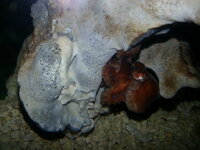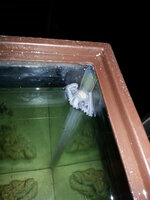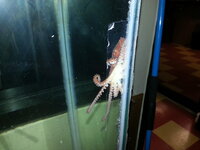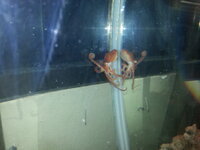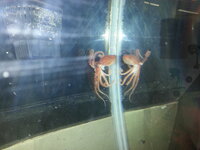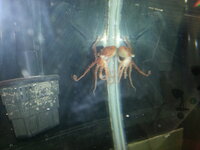You are using an out of date browser. It may not display this or other websites correctly.
You should upgrade or use an alternative browser.
You should upgrade or use an alternative browser.
Octoguard - O. Mercatoris
- Thread starter sirreal
- Start date
Expensive Phone! I believe those are the best phone pictures I have ever seen and some of the best of a merc! The last one shows the little "ruffles" under the eye that help identify the species. Octoguard's color looks so much healthier in these pictures!
thanks again. I was uploading the pics to this computer from dropbox and this computer moves like my snails lol. I set up the 30 tall today and moved some rock, filter and water from the 90 today. I will move octoguard in the next 2 days. What else should I know about having the caribbean octo. Are they more out going. I really hope so. I really want my costumers to see and interact with him. I know this site does not condon blue ring octo keeping but its funny when another site found I was keeping octos, I got a message about one at A lfs. I know the dangers of keeping one but I cant help wanting one. I dont even know if its still there
thank you. Its a galaxy s3 phone. I am glad you like the pics. He did look really good and there was an empty shell from a hermit in front of his barnical. He looked much bigger when He was out also. maybe the size of my pinky or a little bigger. it was just so great to see him
Unfortunately, the O. briareus is not likely to suit your timing well. They are pretty easy to feed between 6:00 AM/PM and 7:00 AM/PM but they are most active in the dark. We have had some that would stay out during supper but others that eat and return to their dens until later. When they are very small, they can still be "awakened" to eat but won't stay out. As they age you are likely to see them longer but not much earlier but sometimes they will come out if someone is giving them attention. Personalities differ greatly. They get big enough that they are not usually hard to find if you look patiently.
If you could pick and choose, the best Caribbean daytime octopus would be O. hummelincki. The Pacific O. bimaculoides is also a good daytime animal but a good chiller would be absolutely necessary (I stress good because you are in FL and in a shop). Sometimes, O. vulgaris ventures out during the day even in the wild but you can't count on it. LittleBit stayed hidden in her den during the day until she was an adult but Margay has chosen a den that keeps him always visible and will often sit just outside it. However, he hunts after 7:00 PM (hand feeding is no problem at any time). I can't be sure if Margay will continue this visibility though as their behavior is not clear until after at least a full month in a tank.
As much as mercs are not as much fun as many of the others, I feel they are really a great first octopus. They teach the keeper a lot about patience
If you could pick and choose, the best Caribbean daytime octopus would be O. hummelincki. The Pacific O. bimaculoides is also a good daytime animal but a good chiller would be absolutely necessary (I stress good because you are in FL and in a shop). Sometimes, O. vulgaris ventures out during the day even in the wild but you can't count on it. LittleBit stayed hidden in her den during the day until she was an adult but Margay has chosen a den that keeps him always visible and will often sit just outside it. However, he hunts after 7:00 PM (hand feeding is no problem at any time). I can't be sure if Margay will continue this visibility though as their behavior is not clear until after at least a full month in a tank.
As much as mercs are not as much fun as many of the others, I feel they are really a great first octopus. They teach the keeper a lot about patience
Its strang how one is so different then another. My first octo. A vulgaris I think. was out durnig the day all the time. the more I think about it the more I realize I didnt give him much hiding places. but he was very active when I was home. I dont have any pics of him, I wish I did. Computer crashed and I lost everything. I really wish I did because I would love to be sure what type he was. He was in a 42" tank and before he died he could reach end to end if he wanted too. I dont know what sizes Hummelinki or bimacs get but I didnt think they got to those sizes. please correct me if I am wrong. I am going to research those 2 species.
An update on octoguard. he was back in his barnicle this morning and pulled the crushed coral over him again. The 2 empty hermit crab shells just outside. I want to try and experiment and put the red lights on as sugested but the white lights running in a reverse time. the new tank is in my office and it is not bright in there at all during the day. I have heard of some people doing this just dont remember if it worked.
An update on octoguard. he was back in his barnicle this morning and pulled the crushed coral over him again. The 2 empty hermit crab shells just outside. I want to try and experiment and put the red lights on as sugested but the white lights running in a reverse time. the new tank is in my office and it is not bright in there at all during the day. I have heard of some people doing this just dont remember if it worked.
No bit problem with the white day lights as long as Octoguard had darkness so you will want to arrange the 30 to give him darkness if you have extra lighting. I don't use other lighting with mercs (the room gets a lot of natural light though) and have had better interactive success (albeit at 11:00 PM) but I can't say it is because I don't add daytime light (you might want to consider keeping the 30 at home). The red light during the day is totally unnecessary, I just leave it on 24/7 (even if I have white/blue lights on the tank - not something I did with O. mercatoris but do have on other tanks) because it reduces yet another electrical appliance (a timer) for the tank. I will warn you that the red light is great for viewing but really, really bad for photography (I have a few unposted photos that make it look like there is a layer of blood (not octo blood because it is not red but almost transparent with a blue cast, you will never see it) globbed at the top of the tank.
 (it also helps with clearer memories
(it also helps with clearer memories  ).
).
Your first octo's daytime activity sounds a lot like O. hummelincki but vulgaris are, IMO, the smartest of the lot and possibly most inclined to interact with humans (anecdotal from on-line and written text about them interacting with divers). They can be found hunting at all times of the day even though they are listed as crepuscular (early evening and early morning hunters - ATM, Margay seems to think 5:00 is a good time to explore but we are still acclimating). O. briareus reaches that size (smaller mantle than O. vulgaris but longer arms) but a lot of daytime activity is not likely. Hummelincki can have an arm stretch of about 18" (personal observation but there is a huge sizing difference with this species) but even stretched, it would be unusual to see one with arms that could span more than about 3'. Hummelincki also has eye spots you would have detected and a shorter lifespan so I think your ID call of vulgaris is highly likely.
All that being said, each octopus will have its own personality. There are generalizations that I make but any that I hold firmly will be/have been broken as soon as I mention them too many times
Yet another reason for keeping an on-line journalI dont have any pics of him, I wish I did. Computer crashed and I lost everything
 (it also helps with clearer memories
(it also helps with clearer memories  ).
).Your first octo's daytime activity sounds a lot like O. hummelincki but vulgaris are, IMO, the smartest of the lot and possibly most inclined to interact with humans (anecdotal from on-line and written text about them interacting with divers). They can be found hunting at all times of the day even though they are listed as crepuscular (early evening and early morning hunters - ATM, Margay seems to think 5:00 is a good time to explore but we are still acclimating). O. briareus reaches that size (smaller mantle than O. vulgaris but longer arms) but a lot of daytime activity is not likely. Hummelincki can have an arm stretch of about 18" (personal observation but there is a huge sizing difference with this species) but even stretched, it would be unusual to see one with arms that could span more than about 3'. Hummelincki also has eye spots you would have detected and a shorter lifespan so I think your ID call of vulgaris is highly likely.
All that being said, each octopus will have its own personality. There are generalizations that I make but any that I hold firmly will be/have been broken as soon as I mention them too many times
After reading your last post mentioned bringing octoguard home and into our bedroom"in the evenings we spend most our home time there" she agreed!!! This is a big suprised since I got her a 29 biocube with a common atlantic seahorse that lived for almost 4 years. But when it died she was so sad that she didnt want him replaced and to get tank the tank out of the bedroom. Mind you there is a beautiful manderin goby that only eats flake in that tank but she doesnt want it in the room. It reminds her of tritan the seahorse. So her saying yes to octoguard is a big deal. I did explain that octoguard might only live weeks and as long as 6 months. I will move him/her tomorrow. Also I am getting Tranny tomorrow. so I will start a new thread about him with pics By monday. I am going to get a vulgaris one day soon. I still think It would love having a lot of interaction like it would have at my shop. But for now I am very happy having my merc and having it at home will mean a lot more seeing him out which I promise I will post lots of pics and maybe some videos. I hope to see more octos on this site very soon. I counted last night and for all the people on this site there sure are not many octos being kept at the moment. At least not many doing a journal of them. thank you again for all your knowledge.
Typically there are just under 50 octopuses a year but I have not counted them for last year to see if it has changed. One way to find octos and species being kept is to use the list of our octopuses threads at the top of the journals forum. The list has links to the journals (starting with 2008). The dates are based upon first journal entry and, when I know it, the date of death (often it is not reported). The consolidated list has posts for each prior years so go to the last page on the consolidated for animals acquired in 201. The current year has its own thread.
Keep in mind that cephalopod keeping (octopuses and cuttlefish) are only a part of TONMO. We serve a variety of ceph interests including education (anything from elementary to post doc connections, including the occasional internship postings), the latest in ceph related science news, ocean awareness, a little direct reporting on projects graduate students and post doctoral members are inventing and ceph humor. There is more to explore
Keep in mind that cephalopod keeping (octopuses and cuttlefish) are only a part of TONMO. We serve a variety of ceph interests including education (anything from elementary to post doc connections, including the occasional internship postings), the latest in ceph related science news, ocean awareness, a little direct reporting on projects graduate students and post doctoral members are inventing and ceph humor. There is more to explore
thanks D I know this site and its staff do much more then just a forum for cephs. And I applaud the site and the people that work for and volunteer for it. If you google octopus tonmo comes up in the first couple sites and it is known as the one and only site for cephs. There is no other site with as much info and I am proud to be a member. I am A little shocked that there are not more members, I am sure there are plenty of people that have had or have octos. I know there are more keeping them or at least I think there are more. 50 per year !!!!! as many people that have salt tanks in the United states and only 50 have octos per year. I know there has to be many more then that. I guess I am more surprised that more dont search out info to help them with the husbandry of octos. All we can do is offer the info. You can lead a horse to the water, you cant make them drink.
update. So I go and get tranny today. stop at the church"home depot" and get red light bulbs and fixtures. Went to the shop and moved his barnical to the new tank with some other barnicals. I set up the red lights and am about to let out tranny and look closely into octoguards barnicle and notice a bunch of coral but no octo. HMMMM ok so I start looking in the new tank and no hes not in there so I go back to the 90 and start looking. cant find him!!. start moving everything and find him under a rock in the corner. soon as I move the rock he starts trying to escape and inks. the amount is not much but he does it about 5 times. well now I have to catch him with a net. he is not happy about any of this. I catch him and run him to the other tank. where after being put in the new tank he inks again 2 more times. I will say the ink is kind of easy to remove. it stays in clumps and you can use a net and scoope it into a bowl with water in it. I will do major water changes tomorrow just to be on the safe side. I took several pics of octoguard in his new tank. I will post them as soon as they upload to the computer.
Now on to tranny. He cant be called an octo because he only has 5 arms. He is quit large so I am guessing he is an adult allready. I do love the colors he/she has. He is a nice white with a lot of blue. I will look for the 3rd arm being curled as soon as he is calm and happy. He aclimated well. I have read that some have had problems with getting them to come out of there bag. this was so nice and went so smooth. i cute the bag open and just opened the hole and about 5 seconds one arm came out then another untill he just slowly came out and slowly went to the bottom found a nice rock checked it out went under it and across the back. checking out everything. this was all with the light on. I put the top back on and set up the red lights and tuned the overhead lights off and he started coming out right away. I have several pics that I will post soon as they upload to the computer. I guess we can start another journal for tranny.
Now on to tranny. He cant be called an octo because he only has 5 arms. He is quit large so I am guessing he is an adult allready. I do love the colors he/she has. He is a nice white with a lot of blue. I will look for the 3rd arm being curled as soon as he is calm and happy. He aclimated well. I have read that some have had problems with getting them to come out of there bag. this was so nice and went so smooth. i cute the bag open and just opened the hole and about 5 seconds one arm came out then another untill he just slowly came out and slowly went to the bottom found a nice rock checked it out went under it and across the back. checking out everything. this was all with the light on. I put the top back on and set up the red lights and tuned the overhead lights off and he started coming out right away. I have several pics that I will post soon as they upload to the computer. I guess we can start another journal for tranny.
Fair warning. The first month of behavior can be very different than the following months, especially with sitings and daytime activity. It really takes them a full month to acclimate to tank environment and a very few never do. I usually consider my octos fully acclimated when they wave a warning arm around in defense of their dens when I clean a tank. To me this suggests they have established a territory and claimed their home. We also see them go through periods of very interactive to reclusive over their lifespan but I have never been able to clue in on what brings about the changes. One thing we have seen on several occasions is the understanding that the keeper is absent for a week or more. Several people have noted "welcome home" or "destruction while you were away" behaviors. Most recently, my son (who lives at home ... still  ) was charged with feeding our last two when we went on vacation for two week. Since he lives here, he is not a new face but after about three days, one animal ate daily but would only show arms to be fed and the other sulked. Both animals were on the front glass when we walked in the door. My son was amazed. They continued to be more interactive than before we left for about a week and it was clear that food was not part of the formula.
) was charged with feeding our last two when we went on vacation for two week. Since he lives here, he is not a new face but after about three days, one animal ate daily but would only show arms to be fed and the other sulked. Both animals were on the front glass when we walked in the door. My son was amazed. They continued to be more interactive than before we left for about a week and it was clear that food was not part of the formula.
Similar threads
- Replies
- 3
- Views
- 132
- Replies
- 148
- Views
- 5K
- Replies
- 21
- Views
- 2K

